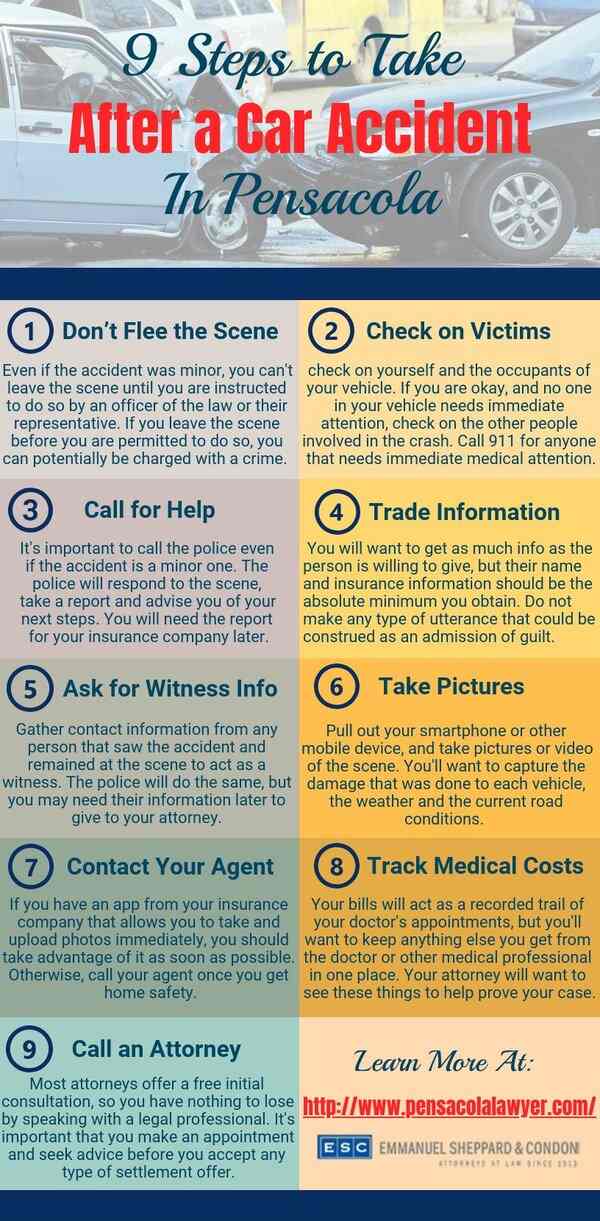

Being involved in a car accident is stressful. Unfortunately, these incidents happen to hundreds of people across the state of Florida every day. It can be difficult to stay calm following a car accident, especially one that is severe in nature. However, if you can remain calm, you will have a much better chance of taking the appropriate steps that will help you in the long run.
Here is what you need to do immediately following a car accident in Pensacola. If you follow these steps, your opportunity of securing financial compensation from the at-fault driver will increase dramatically.
Even if the accident was minor, you can’t leave the scene until you are instructed to do so by an officer of the law or their representative. If you leave the scene before you are permitted to do so, you can potentially be charged with a crime. This will compound your problems, which is not a situation you want to put yourself in.
However, if the accident is minor, you should move all of the involved vehicles to a safer area off of main roads. This will help keep you, other drivers involved in the accident and drivers passing by the accident safer.
As soon as you have regained control of your emotions, check on yourself and the occupants of your vehicle. If you are okay, and no one in your vehicle needs immediate attention, check on the other people involved in the crash. Call 911 for anyone that needs immediate medical attention. Don’t attempt to move anyone who may have a head, neck or back injury.
It’s important to call the police even if the accident is a minor one. The police will respond to the scene, take a report and advise you of your next steps. You will need the report for your insurance company later.
The next step is to exchange information with the other driver involved in the accident. You will want to get as much information as the person is willing to give, but their name and insurance information should be the absolute minimum you obtain. Do not make any type of utterance that could be construed as an admission of guilt.
Gather contact information from any person that saw the accident and remained at the scene to act as a witness. The police will do the same, but you may need their information later to give to your attorney. Witness accounts of the accident can help you prove your case in court.
Pull out your smartphone or another mobile device, and take pictures or video of the scene. You’ll want to capture the damage that was done to each vehicle, the weather and the current road conditions. Take a picture of the other driver’s insurance card and license plate. The pictures or video will be evidence that you can use if you decide to file a personal injury lawsuit.
If you have an app from your insurance company that allows you to take and upload photos immediately, you should take advantage of it as soon as possible. Otherwise, call your agent when you get home and have had a moment to settle your thoughts. You may not be required to answer every question they ask, but you will have to provide specific information. Look at your policy documents to determine the requirements following an accident.
Your bills will act as a recorded trail of your doctor’s appointments, but you’ll want to keep anything else you get from the doctor or other medical professionals in one place. Your attorney will want to see these things to help prove your case.
Lastly, be sure to reach out to a car accident attorney. Most offer a free initial consultation, so you have nothing to lose by speaking with a legal professional. It’s important that you make an appointment and seek advice before you accept any type of settlement offer. It will be too late to file a suit once you have accepted money from an insurance company or private party.
If you have been involved in a car accident in Pensacola and need assistance, please reach out to our office today. We have a team of experienced personal injury attorneys, and we are ready to take on your case. We will fight to get you the compensation you deserve. Call today to arrange your consultation, and learn more about your legal rights and options.
